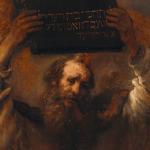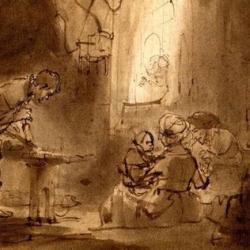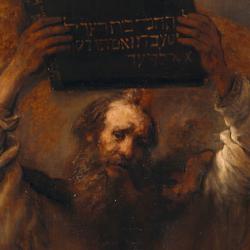English translations typically say that Israel remembers the Sabbath to “keep it holy.” That implies that the day is already holy, and that Israel maintains its holiness by ceasing.
That is true; Israel’s consecration of the day depends on Yahweh’s prior consecration of the day (v. 11). In some places, the Lord commands Israel to “guard” the Sabbath, which implies that it is a holy thing that must be protected from profanation.
But the verb is more direct. It simply means “to sanctify” or “consecrate” or “make holy.” Israel’s activity consecrates the day of ceasing.
This is consistent with other parts of Exodus, where Moses consecrates the tabernacle, the priest, the furnishings of the tabernacle by certain ritual procedures – by anointings, by offerings, by the elaborate rite of filling that consecrates Aaron and his sons as priests.
Israel consecrates this day by the things they do on it. By performing Yahweh’s prescribed rituals, Israel’s consecrates the seventh day.
What does it mean to consecrate a day? It might be easiest to think about holy time by analogy with holy space, which is less elusive. Holy space is space claimed by God; He claims space by being present at a place in glory. The basic principle is: “I will consecrate it by my glory.”
Everything associated with the space becomes holy. When Yahweh is present in glory, the ground becomes holy; it is Yahweh’s ground. When He indwells the tabernacle by His glory, He claims the tent and anything that enters the tent has to be qualified to enter.
A holy thing must be used for God’s purposes. A holy fork cannot be used for a barbeque; holy incense can’t be used at home. Holy things belong to God.
Holy time is time claimed by God. The Sabbath is God’s day in the same way that the tabernacle is God’s space. It is a day of His glory, the day of completion. He claims it, and so it must be used as He demands. On the Sabbath, Israel is on the Lord’s time. Using that time in any way other than as Yahweh commands is sacrilege, a breach of a holy boundary.
Consecrating the day also implies a liturgical event. Israel claimed the seventh day as Yahweh’s by serving Him on that day. They consecrate the day by offering worship. At the sanctuary, extra offerings were offered morning and evening (Numbers 28) and throughout Israel the people gathered in local “synagogues” for sacrifices of prayer. They consecrated the day by liturgical acts.
Consecrating the day means coming to God’s house, His place of rest. Israel consecrates the day by keeping Sabbath in the presence of the Sabbath-keeping God.
















